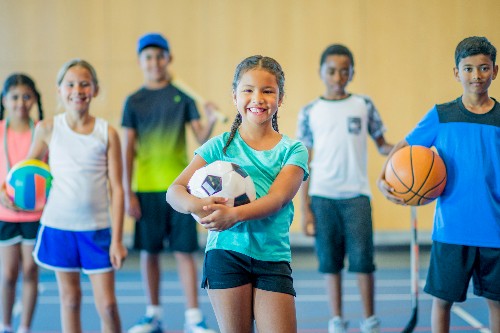
New research has revealed children's physical activity levels in the UK were significantly lower by the time the COVID-19 pandemic public lockdown restrictions were lifted.
The study, led by the University of Bristol, found that by the end of 2021 little more than a third (36%) were meeting the national recommended physical activity guidelines.
While there was no change in their parents' physical activity levels, the National Institute for Health and Care Research-funded study findings showed 10 to 11-year-olds took part in on average just 56 minutes – less than the recommended hour – of moderate to vigorous intensity physical activity during weekdays from last April to December.
That's around eight minutes on average less, a drop of 13%, than children of a similar age were doing before the pandemic.
Senior author Russ Jago, Professor of Physical Activity and Public Health, said: "It was surprising the extent children's physical activity levels had fallen after the pandemic, indicating that changes in physical activity patterns did not revert to previous levels once freedoms had been restored.
"These findings highlight a greater need to work with children, families, schools, and communities to maximise the opportunities for children to be physically active, as we emerge from the COVID-19 pandemic."
The findings showed children were less active at the weekend than during the week, taking part in 46 minutes of moderate to vigorous physical activity during weekend days. This was around 8 minutes lower than the activity of children who were measured using the same methods pre-pandemic.
The study, published today in the International Journal of Behavioural Nutrition and Physical Activity, also revealed a marked increase in sedentary time, with children spending 25 minutes longer being sedentary per day, than previously during the week.
The National Institute of Health Research-funded study recruited 393 children and their parents, from 23 schools in the Bristol area, who wore an accelerometer to measure intensity of physical activity and answered a questionnaire. This information was compared with data from 1,296 children and their parents who were recruited from 50 schools in the same area before the pandemic.
Physical activity is important for children's health and happiness. The UK Chief Medical Officers (CMOs) recommend all children and young people should take part in an hour of moderate to vigorous physical activity (MVPA) each day. This is activity that gets children slightly hot, slightly sweaty, and out of breath. The Chief Medical Officers also advise children should limit the amount of time they spend being sedentary.
The study's first author Dr Ruth Salway, a Statistician at the university's School for Policy Studies, said: "The key strength of this study was we used data collected before and after the pandemic, using the same methods and in the same schools.
"The data clearly demonstrates children's physical activity had deteriorated once the restrictions were lifted. This emphasises the importance of understanding how such habits change over time, so appropriate support and interventions can be introduced as normality resumes."
Paper
'Accelerometer-measured physical activity and sedentary time among children and their parents in the UK before and after COVID-19 lockdowns: a natural experiment' by Ruth Salway et al in the International Journal of Behavioral Nutrition and Physical Activity.






